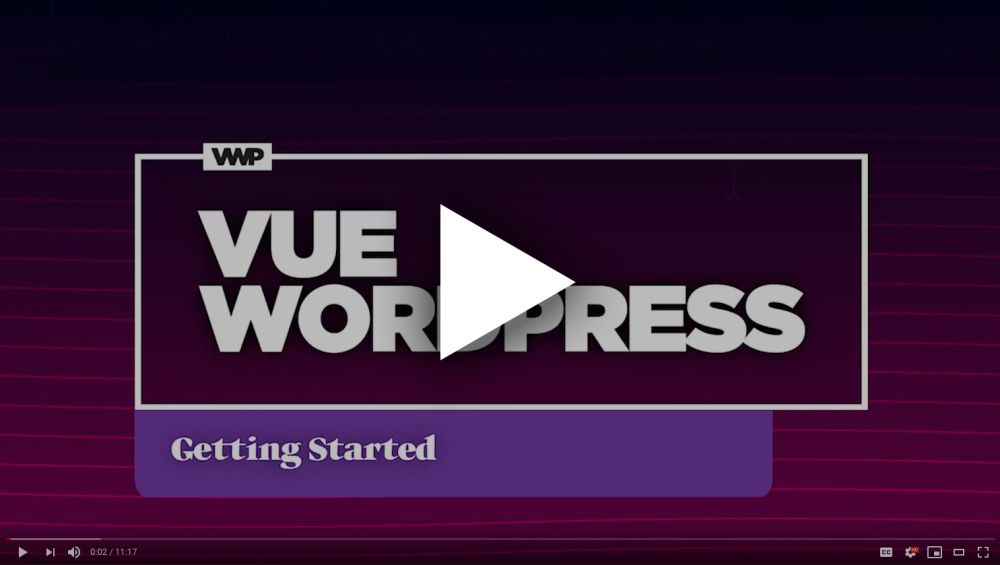Awesome
VueWordPress Theme Starter
A true WordPress theme with the guts ripped out and replaced with Vue. Looking to create a Vue-powered WordPress plugin? I've got a starter for that too!
Who's this for? When I started diving into using Vue in WordPress I found plenty of great starters for headless WordPress, but I had the added constraint of needing to run the front and backend on the same host, thus this project was created.
Need help? Join the VueWordPress Slack.
Features
- Tailwind is built in! If you don't want Tailwindcss in your project you can easily disable it by removing the import statement in
styles.css. - Hot reloading/browsersync for local development.
- VueRouter integrated
- Vuex integrated (with sample WordPress-centric modules)
- Axios for API requests
- Follows the development guidelines/structure set forth by Vuejs
- Bare essentials needed for a functional WordPress theme
- All requests are redirected back to the index.php so your Vue routing is respected.
- PostCSS baby
Getting started
- Clone the repo inside of your
wp-content/themes/directory - Navigate to the theme directory in your terminal and run
npm installnpm run watchfor developmentnpm run buildwhen you're ready to deploy the theme. - Activate the theme in your WordPress instance.
- Update your permalink settings
(Settings -> Permalinks)to be "Day and name". If you don't want to use this setting you'll need to update the Vue router so it can find your content correctly. Please note that if you want to use a different permalink structure you'll need to update./src/router/index.jsso it looks for the correct path. - Boom.com!
Since by default Tailwind completely resets all styles/spacing, there are a few initial styles I've provided in src/assets/css/_tailwind.css to make things appear more like you'd expect. Modify to your liking!
Video Training
Code Organization
All of the code you're going to edit is located in /src/. From there it's broken into a few logical directories.
/src/apifor API requests/assetsfor images mostly/componentsVue components/routervue-router directives/storevuex store and modules/assets/cssCSS styles/vendor3rd party scripts and libraries
All scripts and styles in /src are compiled down to the /dist directory, which is what you will deploy. When you're ready to deploy don't deploy the src/ directory.
New to Vue?
Not sure where to begin? The Vuejs documentation is actually amazing, but if you're looking for video training I highly recommend the free Learn Vue 2: Step By Step course over at Laracasts. There's also a great playlist by Academind available on YouTube that covers pretty much everything you'd want to know about building a fully-featured Vue app.
I've created a couple of example components in src/components/widgets to give you an idea of how to work with the Vuex store data.
If you're new to Vue/Vuex I would do the following:
- Open up
src/app.jsthis is the main JS file for the app and will give you a glimpse into what's going on behind the scenes. - Next open up
src/App.vuethis is the primary app component, a page wrapper of sorts. It contains the header/footer and the<router-view>component which is what loads in all of the other screens as you navigate around the app. Note that by defaultsrc/components/Home.vueis loaded into therouter-viewinitially. - Next open up
src/routes/index.jsand notice how the routes are setup by default. Out of the box there is only one route, the/or home view. For more information on setting up routing within your app checkout Vue-Router. - Next is the Vuex store. I won't cover how that works here as it's a tiny bit more advanced. Check out all files in
src/storeand start to familiarize yourself with what's going on. It's based on the official Vuex example project setup and uses Vuex modules. By default I've included a couple of modules I thought you might need.
The first thing you're probably going to want to do is start editing and components in src/components/.
External References
- Creating Vuex Modules
- vue-router
- WordPress REST API
- WordPress REST API Handbook
- Expose ACF fields to REST API
Features coming soon:
- More documentation
Changelog
2020-01-29
- Removed some legacy CSS, further integrated Tailwind.
- Added browser-sync!
- Reorganized and updated the webpack config and files.
- Updated many npm packages including webpack
- Updated webpack production minification/optimization settings.
2020-01-28
- Updated npm packages
- New theme screenshot
- Updated README
- Updated Home component
2020-01-28
- Added tailwindcss support.
- npm module updates
- updated to latest version of Vuejs
2019-02-05 Added
- Support for postcss
- New css style examples
- Cache busters for js and css
Changed
- Updated outdated npm packages
- Recent post and Page widgets to use router-link
- Removed Laravel Mix and replaced with standard webpack config
Removed
- Example Firebase integration
- jQuery
- Several unused npm dependencies
- Bootstrap / Bootstrap Vue
- Several variables that were stored on the window object
- Support for sass styling (switched to postcss)
2018-08-20 Added
- Default routing for posts and pages. @EvanAgee
- Views for posts and pages. @EvanAgee
- getters for pages. @EvanAgee
- Examples for fetching pages/posts with either Vuex actions OR in component. @EvanAgee
- Activated LocalStorage plugin in store. @EvanAgee
- Loader component. @EvanAgee
Removed
- UglifyJS. @EvanAgee
2017-10-24 Added
- status_header(200) to keep Wordpress from returning 404 for vue-router paths.
2017-10-21 Removed
- vue-slick dependency
- vue2-google-maps dependency
- unnecessary header/footer php files
- the-tailor dependency
- font-awesome dependency
Changed
- Updated webpack (Larevel Mix) config
- Switched from Bootstrap to Bootstrap-Vue
Fixed
- Fixed index.php
2017-10-17 Added
- More documnentation. @EvanAgee
- Post module. @EvanAgee
- A few code comments. @EvanAgee
- Example widgets for posts and pages. @EvanAgee
Changed
- Home page to display the posts and pages widgets. @EvanAgee
2017-10-11 Initial commit



